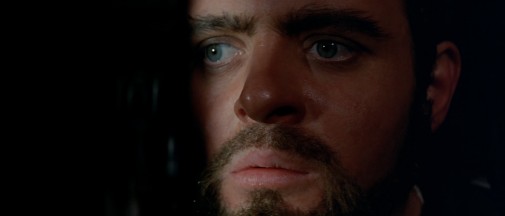
As the Oscar nomination morning approaches, it seems certain that Anthony Hopkins is about to receive his sixth nod. Seeing as he's considered a wizened old thespian of stage and screen, it may be difficult to recall the days when he, like so many others, was a young actor. In 1968, Hopkins was nearing his 30th birthday when his second ever feature premiered. Thanks to that film, he got the first brush with film awards and might have even come close to an Oscar nomination. In Anthony Harvey's adaptation of James Goldman's The Lion in Winter, Hopkins plays Richard, future king of England, son of Henry II…
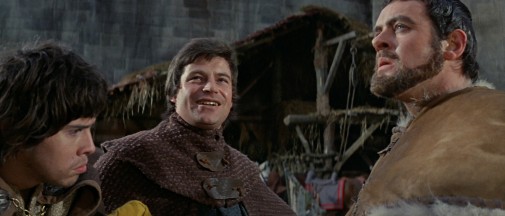
Mixing over-literary garrulousness with grubby family melodrama, The Lion in Winter is a royal soap opera, and not particularly ashamed about it. Even as it disguises the sordidness with cod-Shakespearean witticisms, its true nature is never too hard to figure out. The story, to the extent that there is one, concerns the Christmas celebrations of 1183 at King Henry II's court. For the occasion, the monarch has temporarily freed his wife, Eleanor of Aquitaine, from house arrest and invited their three living sons, Richard, Geoffrey, and John, to attend the party. Joining the unhappy clan is Henry's favorite mistress, Alais, as well as the young King Phillip II of France.
As it happens, Henry and Eleanor's firstborn, a never-seen Henry (Jr.), has died over the summer so there's a little matter of succession to take care of. Primogeniture dictates Richard's next in line, a fate Eleanor contemplates with delight. However, the king prefers John out of his brood and is also talking of marrying Alais to one of his sons. This is a family accustomed to semi-incestuous liaisons, you see. In any case, these interpersonal dynamics serve as a structure for Goldman to display a barbed tapestry of treasons, manipulations, palimpsests of duplicity, Machiavellian scheming.
The tragedy of King Lear is overtly referenced by the text but only one character lives through a tragic arc in the film's limited frame. There are other tragedies in the characters' shared histories, but most of them unraveled long before this particular narrative. Richard's trajectory, however, feels like a present drama rather than the coda to an already concluded tale. His parent's grand epics are behind them and these, their twilight years, are spent writhing in acidic hatred. For the next in line to the throne, this holiday season represents the culmination of years of heartbreak, thwarted ambition, the fight for that hollow crown that rests upon his father's golden head.
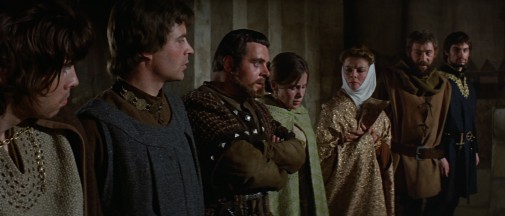
Appropriately, Hopkins appears to tackle the challenge of The Lion in Winter with a different strategy than his fellow cast members. While the other actors seem voracious at the opportunity to sink their teeth in Goldman's succulent bon mots and florid insults, Hopkins is more interested in constructing his characterization out of the silences between dialogue, the lines his body draws on Douglas Siocombe's painterly shots, the emotion his own face can sculpt out of flesh, wrinkled skin, teary eyes. From his very first scene, Hopkins' Richard is defined by the energy contained within his body, a capacity for violence that's barely kept in check. He is the fighting man in the tryptic of warrior, liar, and fool that is Henry's brood.
Brute force, acidic wit, and the obstinacy of an entitled brat - these are the qualities that define the brothers, the elements that differentiate them, and that the text seeks to subvert as it goes deeper and deeper into this wretched family. They may all indulge in their archetypes, but there's more beneath the surface, the sibling's apparent unidimensional personalities a mere bit of social playacting. This is never more evident than in their first meeting, far from their parents' eyes. Each one exchanges insults the same way normal families may exchange presents. Nonetheless, attentive viewers can discern what words carry the weight of truth and what lines sound hollow even to the people within the story.
There's genuine venom in the condescension with which Richard regards John, for instance. In contrast, we sense the older brother may respect the viperous Geoffrey. Hopkins expresses this with his authoritarian voice, a general's dismissive command, whilst keeping his visage stony, studiously inexpressive. To Geoffrey, he may spit some pointed words, but the cadence and posture speak only of cautious respect, not contempt. One may even find a glint of amusement in the way Hopkins regards John Castle's take on the middle sibling. Still, this only happens when none of the other characters are looking.
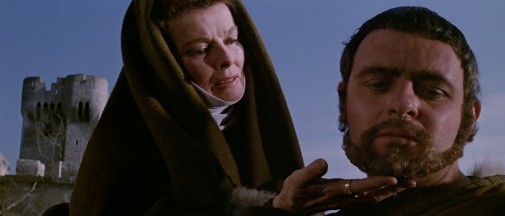
His rigid posture when sharing the scene with his parents, Katharine Hepburn and Peter O'Toole, is even more interesting. For the father, there's usually a closed-off animosity, not too overt lest he jeopardizes the inheritance. With the legendary actress, Hopkins' choices may initially evoke a son's hatred for his mother, before later developments reveal another commanding emotion – fear. Richard is terrified of his mother, what she might do to him, what painful sentiment she might inspire. Only John doesn't fear Elanor in this royal plot and that's because he's stupid. Anyone with any sense knows to regard the queen like one regards a sleeping dragon. Disturb it not or you might end up burnt to a crisp.
The actor plays someone shaped by the two monsters who bore and sired him. Pay attention to the cloud of quivering nerves storming over his petulant head and you'll get the image of a little boy, insecure about his parents and their elusive care. At one point, he asks if Eleanor's words are designed to hurt him. His posture is still, strong as a castle, rectilinear and unshakeable, but there's a visible quiver in his eyes and lips. We know she destroyed him. So much that his soul is covered in scar tissue, an armor of wounds. When Richard goes along with her plans, is he convinced by the queen's promises or pretending? Whatever the answer, one thing seems sure about Hopkins' portrayal. Richard wants to believe, he wants it all to be true.
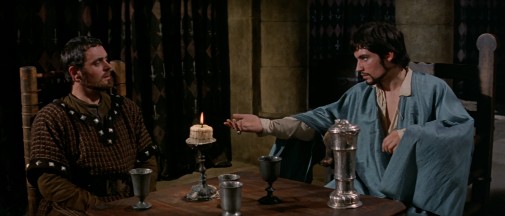
These first inklings of vulnerability are an overture to Anthony Hopkins' big showcase sequence. Late at night, after a wedding has been set up in a flash and just as quickly disassembled, Richard goes to meet with the King of France, the man who once upon a time was his lover. Timothy Dalton, in his first movie role, plays Philip like a serpentine fox, outwitting everyone with naked hunger, fangs bared at all times. Nonetheless, his beauty and sensual invitations seem enough to sway Hopkins' warrior. Whether in lust or love, Richard is besotted by the French monarch and when the rug is pulled from under him, the fall is mighty indeed. Philip's affections were nothing but another lie, and they are revealed to all while Richard hides, powerless, behind a shameful curtain.
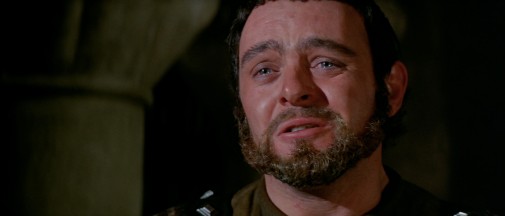
How can one not feel for this prince whose teenage infatuation is so horribly exposed to his proud father? It's a betrayal on so many levels. Philip's words taint the sweet memories, attack Richard's self-worth, his essential beliefs. One would think the son of these horrid people would be used to lacerating pain, but this blow has seemingly defeated him. He wants love from someone, anyone. His father is unable to give it to him, his mother poisons it with lies, his brothers snarl when he asks. As for this other man, this lustful hero who once professed adoration for Richard, he now reveals the hollowness of that affection too. At that moment, Hopkins acts like a man dying from thirst who had a remnant of watery sustenance until he tries to drink and it turns to ash in his mouth.
What happens next is mostly inconsequential to Richard. As he's imprisoned with his siblings by their father, there's an emptiness in his eyes. Only when Eleanor puts a blade in his hand does he wake from the stupor. It's quite perverse how alive Richard becomes, how at ease he seems when confronting his father with a dagger. With a killing tool in his hand, this man makes peace with his existence. Even as he is condemned to death, Richard looks more serene than when being betrayed by his lover or lied to by the Mephistophelian matriarch. Perchance that's what stops Henry's blade in the end. Did he see a king in the hollow man standing before him? Maybe, and it's true that Richard did get the crown. As Hopkins shows it, the price for that triumph might have been his spirit.
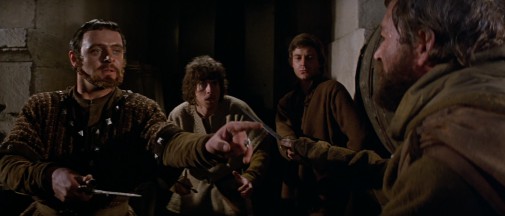
In the end, Anthony Hopkins conquered a BAFTA nomination for his efforts. That might not be a great indicator that he was close to the Oscar nod but I find it hard to think of someone likelier than him. After all, The Lion in Winter was the likely Best Picture runner-up, winner of three statuettes, and nominated in four other categories. The Academy's chosen five in 1968 were Jack Albertson in The Subject Was Roses, Seymour Cassel in Faces, Daniel Massey in Star!, Jack Wild in Oliver!, and Gene Wilder in The Producers. Albertson won for what is undeniably a leading role. The same can be said about Wilder's categorization. Maybe if AMPAs had put those two in their right category, there would have been space for nominating Hopkins.
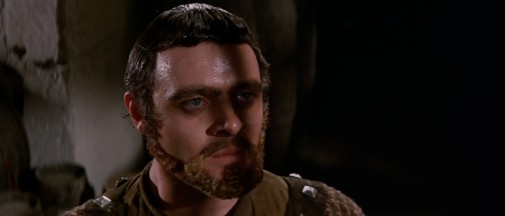
The Lion in Winter is available to rent from most services.